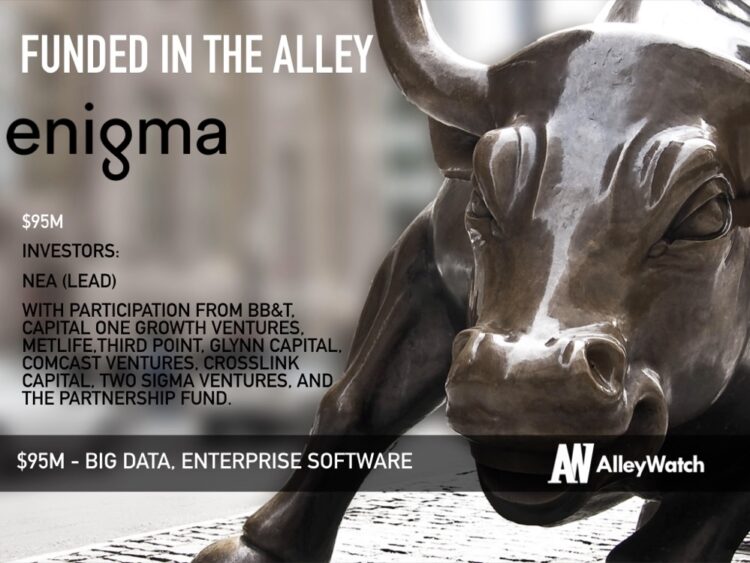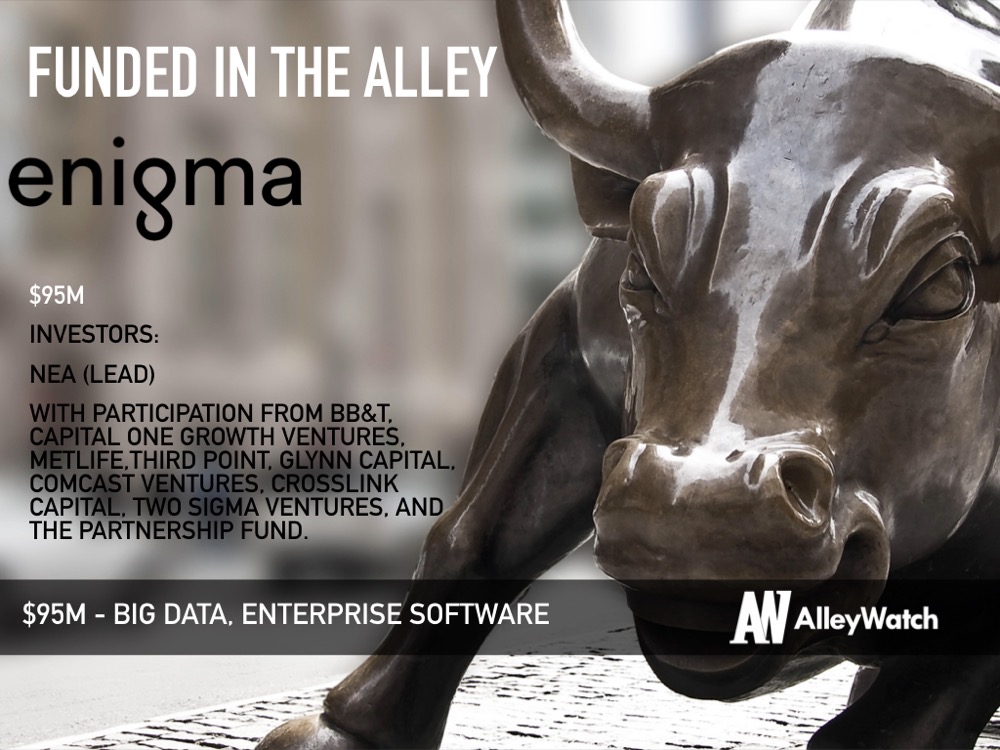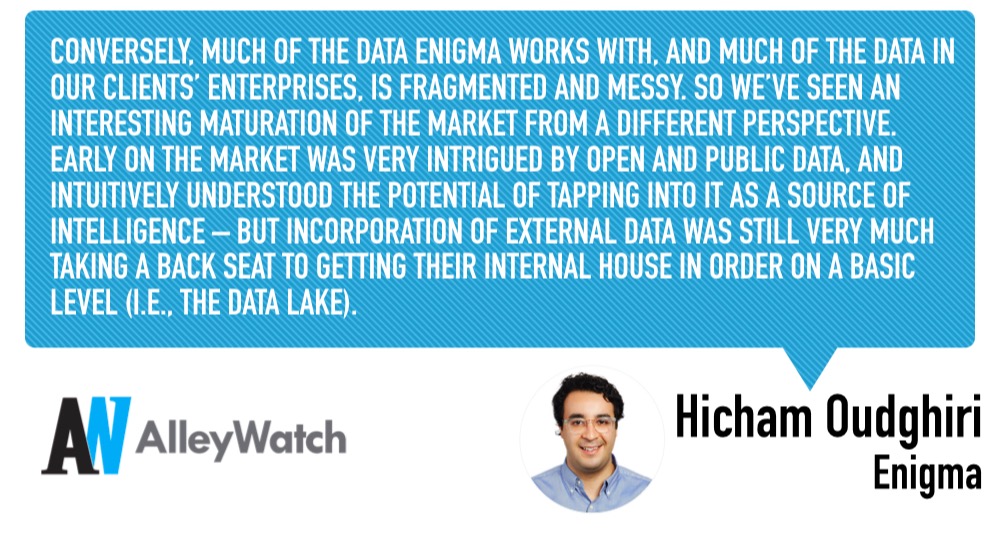Collection of and the access to data are increasingly no longer a pain point; interpreting and organizing the data is where the challenge lies. In order for enterprises to operate efficiently, they need to be able to integrate their own data and layer it real-world, public data to drive informed decisions through a robust data management platform. This is where Enigma comes in through its offering that offers a knowledge graph technology that leverages internal, public, and third-party data harmoniously. These knowledge graphs are versatile with varied use cases for those that have data-driven workflows like mitigating financial risk to improving patient safety.
AlleyWatch spoke with CEO and founder Hicham Oudghiri about Enigma’s mission to implement its knowledge graphs into everyday decision making, and its recent funding, which brings the total amount raised to approximately $130M over five rounds.
Who were your investors and how much did you raise?
We raised $95M in new financing, led by NEA with new investments from BB&T, Capital One Growth Ventures, MetLife, Third Point, and Glynn Capital. Early Enigma investors Comcast Ventures, Crosslink Capital, Two Sigma Ventures, and the Partnership Fund for NYC also participated.
Tell us about the product or service that Enigma offers.
Enigma offers data and data-driven insights to organizations through its unique knowledge graph technology.
Our knowledge graphs transform tables of data into a rich representation of real-world relationships, enabling businesses to ask and answer complex questions with data. The intelligence Enigma offers is powered by the world’s broadest repository of public data, which share for non-commercial use through Enigma Public. To provide businesses with tailored, data-driven solutions, we connect these data assets to official third-party and internal company data. Enigma’s linking and resolution capabilities uncover new, deeper information about people, places, and companies that transform business processes.
We focus on supporting businesses in core workflows that range from identifying insurance risk, to improving medical patient safety, to fighting money laundering.
We continuously expand the intelligence we can offer by ingesting, standardizing, and connecting new data to our graph, as well as by evolving our ontological frameworks we use to interpret the data and serve more real-world use cases.
 What inspired you to start Enigma?
What inspired you to start Enigma?
When Marc and I cofounded Enigma in 2011, we were struck – and inspired – by the immense, untapped opportunities for real world data. We wanted to make data accessible and help people apply it to make more informed choices. We started out with a focus on retrieving and organizing public data so that it could be an asset to individuals and organizations, and we developed Enigma Public so that the world could put this data to use. More recently, we’ve been focused on connecting this siloed public data and integrating third-party and internal company sources, to uncover deeper insights and help companies integrate them directly into their workflows.
How has the data landscape and how organizations approach data changed since you founded the company in 2011?
The idea of data being valuable is not new, but since our founding there has certainly been vast changes in what “value” means, and also transformative changes in the capabilities of companies to leverage data.
Enigma has grown up in the era of “big data” which was really a story about applying open source technologies to large quantities of highly structured data (because it emanates from the protocols of the internet and software systems). As a consequence, most of the companies that were successful in their use of data were internet companies, ecommerce, and the like.
Conversely, much of the data Enigma works with, and much of the data in our clients’ enterprises, is fragmented and messy. So we’ve seen an interesting maturation of the market from a different perspective. Early on the market was very intrigued by open and public data, and intuitively understood the potential of tapping into it as a source of intelligence – but incorporation of external data was still very much taking a back seat to getting their internal house in order on a basic level (i.e., the data lake).
As the market matured, interest in tapping into external data for signal and augmented intelligence grew, but it was still driven by the internal innovators in the enterprise. Now we’ve really hit an inflection point where core business owners in the enterprise realize that if they’re only looking at the information within their four walls, they are making decisions based on an incomplete view of the world. There is also recognition that throwing the well known “big data” technologies that worked on internet data at this “real-world” class of information isn’t sufficient, a much more semantic approach is needed for this to scale. So we’re at a very exciting time for what Enigma does.
How is Enigma different?
Enigma is focused on finding the connections between datasets to contextualize, streamline information, and deliver new, deeper insights to organizations of all kinds. Many data providers offer data mining solutions that interpret a company’s own data assets, and others support companies in centralizing different datasets they hold. Enigma is unique because it connects a company’s own data to diverse external data, which both validates and enriches the data. Enigma helps companies integrate this more complete intelligence directly into their workflows with flexible delivery capabilities.
Additionally, we have deep domain experience organizing and maintaining data at scale, and we are focused on continuously updating our data asset with new public as well as strategic third-party data. By augmenting our knowledge graph with new data and leveraging machine learning that resolves entities with increasing accuracy, we keep our knowledge base relevant and applicable to diverse uses over time.
What market does Enigma target and how big is it?
We target the thousands of companies that rely on hundreds of data-driven workflows that can be improved by linked and enriched data.
The total addressable market spans a nearly limitless range of buyers and use cases. We are currently working on a map of over 100 use cases spanning all the major industries from financial services, to pharma, to consumer goods.
The total addressable market spans a nearly limitless range of buyers and use cases. We are currently working on a map of over 100 use cases spanning all the major industries from financial services, to pharma, to consumer goods.
What’s your business model?
Enigma licenses Data and Software Solutions on a recurring license model to enterprise clients, typically on either an annual or multi-annual basis.
What was the funding process like?
The process was very efficient. Fundraising can be incredibly time consuming, but our goal has always been to not let it distract us from a focus on executing for our clients and building great technology. We’ve been fortunate to have great partners who believe in our vision, see the immense market opportunity we’re pursuing, and are excited about our progress. This has helped us keep our focus as much as possible on operating. The exciting part of this raise was being able to bring on a few new partners with whom we felt really aligned and who all bring different and valuable viewpoints to the table — both traditional VCs and strategists.
Our new investors include blue chip companies making their first venture investments in MetLife and BB&T, which is incredibly rewarding and a testament to the resonance of our work with some of the world’s largest enterprises.
What are the biggest challenges that you faced while raising capital?
The biggest challenge was focusing in on the investor partners that we felt were most aligned with our vision and could bring valuable experience and perspectives to the table. We’ve had the good fortune to speak with many great investment firms and organizations over the past few years, but due to our desire to have an efficient process and keep the focus on serving our clients, we ultimately had to make tough choices about who we were going to speak with about the raise.
What factors about your business led your investors to write the check?
This round included existing partners and new investors. The common denominator across all of our investor partners is a strong belief in the massive and still mostly untapped potential of extracting valuable signal from disparate data, public and private, and applying it to an almost limitless number of business use cases and meaningful societal issues. We all believe that the market opportunity is simply enormous.
Our existing investors have seen our ability to translate this powerful idea into execution by hiring great talent, pursuing a bold product vision, building practical solutions that are driving business outcomes and commercially growing our business. This is what excited them about doubling down on Enigma.
Our new investors, particularly our new strategic partners, were excited by the practical value that we’ve already delivered and the potential to work with Enigma to tackle new areas. We have a shared vision with our strategic partners about how we can deeply collaborate to create significant mutual value over the coming years, which is really exciting.
What are the milestones you plan to achieve in the next six months?
Enigma will use this investment to expand the company’s core offerings, focusing on broadening the reach of our knowledge graph technology. Enigma’s knowledge graphs, powered by public data and machine learning, structure data into connected insights and are the vehicle through which intelligence is delivered to clients. We also plan to expand our integrated solutions into new verticals and build on our past successes in the Financial Services, Insurance and Life Sciences industries. We also plan to invest in growth by continuing to hire top-tier talent and opening our first satellite office to scale out our data acquisition and expand our data integration and delivery capabilities.
What’s your favorite restaurant in the city?
I have so many favorites that it’s hard to narrow in on one. I’d say I eat most often at ilili on 5th Avenue in the flatiron because it’s great food and a great location (it’s located across the street from our office).





